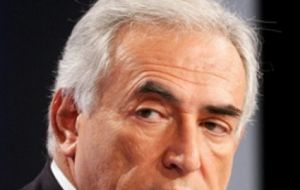MercoPress. South Atlantic News Agency
IMF chief warns of “great recession” but markets react to upbeat banking report
 IMF Managing Director Dominique Strauss-Kahn
IMF Managing Director Dominique Strauss-Kahn The head of the International Monetary Fund says the world economy is likely to shrink this year throwing millions into poverty, in what some are referring to as the “Great Recession”. IMF Managing Director Dominique Strauss-Kahn told a conference in Tanzania Tuesday that sharp declines in world trade are likely to hurt African economies.
The global financial crisis, that might now be called the great recession, provides a sobering backdrop to our conference,“ IMF Managing Director Dominique Strauss-Kahn told delegates at an anti-crisis meeting in Tanzania.
”The IMF expects global growth to slow below zero this year, the worst performance in most of our lifetimes,“ he said, urging wealthy Western countries to maintain financial support for low-income nations.
The IMF director also said there was now ”a real risk that millions will be thrown back into poverty“ across the African continent and that the economic crisis raised ”the threat of civil unrest, perhaps even a war“.
Meanwhile, the chairman of the US Federal Reserve warned that a sustainable economic recovery will ”remain out of reach“ without a comprehensive overhaul of financial regulations.
Fed Chairman Ben Bernanke said officials, both in the United States and around the world, will fail if they only focus on strengthening regulations for certain sectors of the economy, like banking.
Bernanke's comments come as US Congress started work on legislation aimed at enhancing financial regulations and as key financial officials get ready to meet in London ahead of next month's summit of the world's 20 major economic powers - the G-20.
European Union financial officials preparing for the April summit have already decided the IMF should get more money to bail out countries facing economic crises.
In a document released Tuesday, the EU backed calls to double the IMF crisis fund to 500 billion US dollars, suggesting some of the money could come from countries like China and Saudi Arabia, which have built up substantial currency reserves.
However, the document also exposed some disagreements with the US. EU officials rejected the idea of expanding economic stimulus measures, something the US supports.
A World Bank study Sunday said the global economy will shrink in 2009 for the first time since World War II, while world trade is declining at the fastest rate in 80 years.
However stock markets in most of Asia, Europe and the United States bounced back from big losses on Monday, boosted mostly by investors hunting for bargains and an upbeat profit report from US banking giant Citigroup.
Citigroup chief Vikram Pandit said in an internal memo that the bank was seeing a return to profitability in early 2009 after punishing losses last year, although he warned about continued ”market volatility”.
On Wall Street, the Dow Jones Industrial Average and the Nasdaq index rocketed and closed at 5.8% and 7.07% respectively. London's FTSE 100 index of leading shares closed up 4.88%, while the Frankfurt Dax gained 5.28% and the Paris CAC 40 soared 5.73%.
But in Tokyo, the Nikkei stock market index fell 0.44% to its lowest since October 1982 on investor worries following the plummeting of exports. China was also a source of concern as it reported its first drop in consumer prices in more than six years.
In Latinamerica all markets reacted positively to the US (Citigroup) announcement with the Brazilian Bovespa soaring 5.59%, recovering losses from the beginning of the year; Argentina’s Merval jumped 5%; Mexico’s IPC, 3.4% and Chile0s IPSA. 2.84%.




Top Comments
Disclaimer & comment rulesCommenting for this story is now closed.
If you have a Facebook account, become a fan and comment on our Facebook Page!